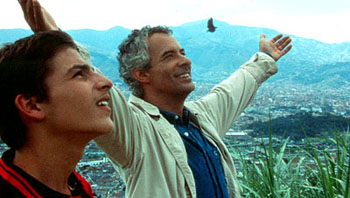![[Metroactive Movies]](/movies/gifs/movies468.gif)
[ Movies Index | Show Times | Santa Cruz Week | Metroactive Central | Archives ]
 Spreading the Word: Anderson Ballesteros and Germán Jaramillo get above the strife of Medellin, Colombia, for a moment in 'Our Lady of the Assassins.' Love and Destruction Drugs, murder and romance thrive in a place of despair IMAGINE A CITY where you could strike anyone who displeased you stone dead. As portrayed in Barbet Schroeder's harrowing Our Lady of the Assassins, Medellin, Colombia, is a city ruled by the pistol. A gay, middle-aged, burned-out writer named Fernando (Germán Jaramillo) has come back to his Colombian hometown to enjoy his decline. In the first scene, a group of men throws him a party in a handsomely decorated flat. They've brought Fernando a welcome-home present; his name is Alexis (Anderson Ballesteros), and the older man is invited by his host to show the lad "to the butterfly room." When they get there, the hustler says, "Where's the butterflies?" Reaching for him, Fernando says, "We're the butterflies." The tryst with Alexis turns to true love. Like an older Virgil and a young Dante, they tour what Medellin has become. Strife between the cocaine barons has turned this thriving mountain city into a murder capital. And Alexis, a sweet, affectionate and unflappable kid, is an assassin for one of the many local gangs. He is also under sentence of death from a rival group. He can't imagine another world, so he's basically cheerful. Fernando can, because he grew up in it, and that deepens his melancholy. Though he's an atheist, Fernando is drawn to churches, the only places in Medellin where traffic, music and gunfire can't deafen a man seeking peace. Schroeder, shooting on high-res digital video, celebrates what beauty there is in the people and surroundings. Much of the setting here is a luxury apartment, above the town. Fernando has some inherited money he proposes to burn through; so for besieged people, Alexis and he are quite comfortable. Apparently, in Medellin, smugglers like to fire off rockets to celebrate the successful arrival of a new shipment--the two take the fireworks as they might, as a celebration of their love. Our Lady of the Assassins is plagued by a very talkative and naive hero; Schroeder doesn't seem to critique the man's occasional dithering silliness. Blame Jaramillo's minorness as an actor; he can never make his own middle-aged, middle-class angst match the terrors of the street. For an educated man, Fernando seems blind to the law of cause and effect. He deceives himself, never really understanding that killing is a reflex act for Alexis (if the kid is angelic, he's a destroying angel). Still, this somber film is laced with romance and fatalistic humor. Schroeder, who survived the company of Idi Amin (he directed a documentary about the lethal dictator of Uganda), is not one to overstate a danger, or to trip out on squalor. Nor is he one to romanticize--as so many cowardly directors will--the cult of the gun. His images of churches haunted with starving addicts and streets where children not old enough to vote have the power of life and death will haunt you like few films this year. Watching Our Lady of the Assassins, it seems certain that this is a view of the city of the future.
Our Lady of the Assassins (R; 98 min.), directed by Barbet Schroeder, written by Fernando Vallejo and starring Germán Jaramillo and Anderson Ballesteros, opens Friday at the Towne Theater in San Jose and the Nickelodeon in Santa Cruz. [ Santa Cruz Week | Metroactive Central | Archives ]
|
From the September 26-October 3, 2001, 1999 issue of Metro Santa Cruz.
Copyright © Metro Publishing Inc. Maintained by Boulevards New Media.